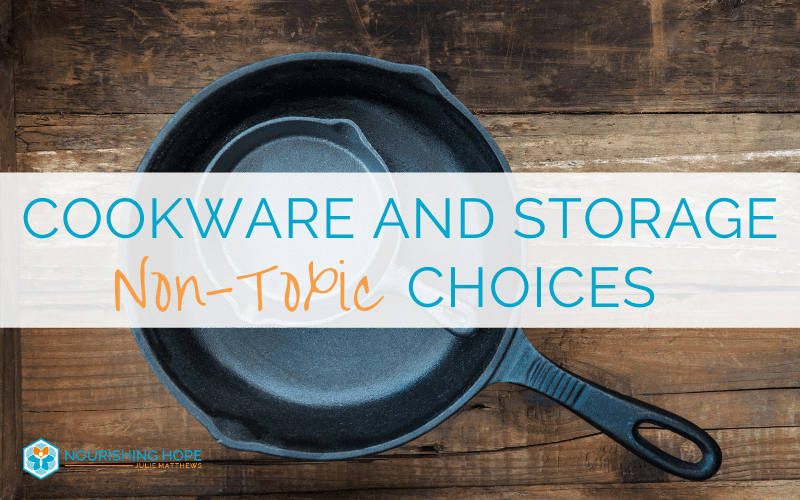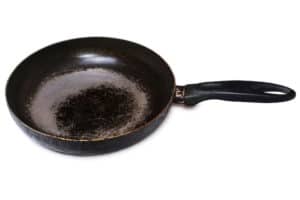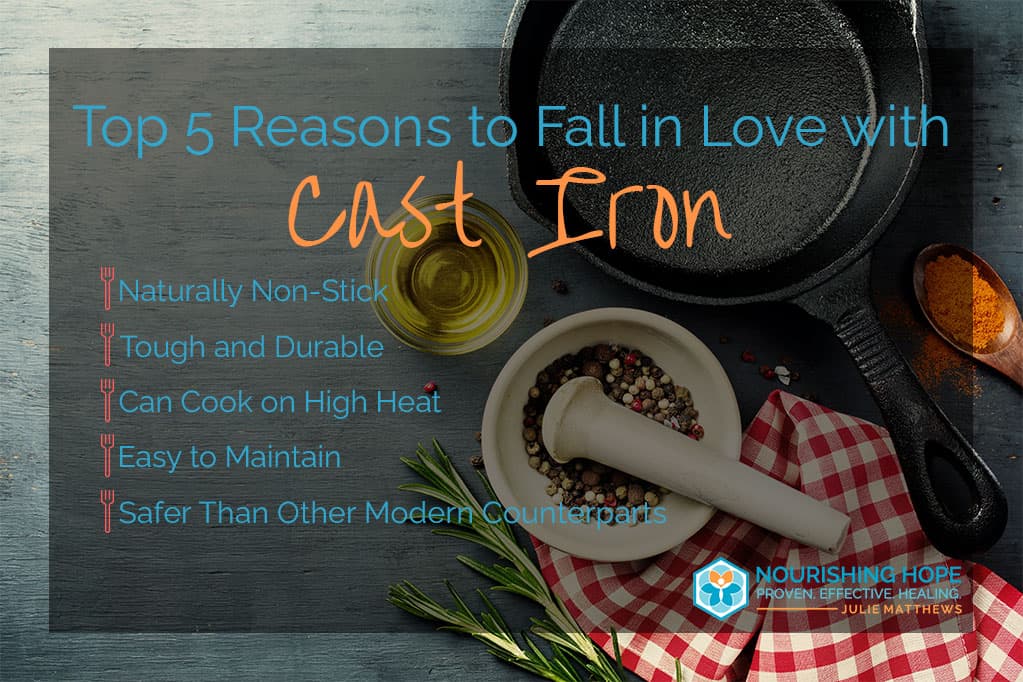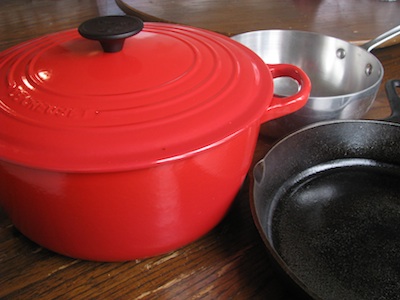
We often spend a lot of time talking about what foods to eat and not eat regarding diet for autism. However, we spend less time on how to prepare the food, cook it, and store it. You don’t need fancy, expensive equipment, but you will want pots and pans as well as storage containers from non-toxic materials.
The cooking tools and storage materials we use can be harmful, depending upon the materials they are made from. The chemicals from pots and storage containers that our food comes in contact with leaches into our food, and therefore exposes us to toxins. I’d like to talk about common cooking equipment and storage materials that are healthier, and how to avoid the toxic ones.
Cookware
What to Avoid
Cookware is often the first question people ask about cooking… what pots and pans are safe to use and not use.
I recommend, do not use aluminum (where the cooking surface is aluminum), copper, or Teflon-coated. These materials contain metals or chemicals that can be harmful to health. Aluminum is known to cause health concerns and not a good material to cook with unless it is a layer inside the pot, which is surrounded by a non-toxic material like steel. And when we cook with copper pots, when our food is exposed to the copper surface, it leaches into our food. While zinc is technical needed in very small amounts as a nutrient, can can cause harm in large amounts, and imbalance and cause deficiency of other minerals such as zinc. Zinc is crucial for good mental health.
 Especially, do not use Teflon. I know they are easy and non-stick but there have been many studies showing how toxic this material is. Even if they are new and unscratched I would not recommend using them, as there is still concern. Teflon is also toxic to produce, so I don’t recommend its use.
Especially, do not use Teflon. I know they are easy and non-stick but there have been many studies showing how toxic this material is. Even if they are new and unscratched I would not recommend using them, as there is still concern. Teflon is also toxic to produce, so I don’t recommend its use.
There are also newer varieties of cookware, all claiming to be non-stick and non-toxic. Because some of these are so new, I have not seen enough research to recommend them.
Recommended Cookware
Cast Iron
As with most areas of nutrition and cooking, I prefer to stick with the traditional and classic options. Cast iron is a great option. Yes, it does take some time to learn how to clean it and keep it seasoned, but its benefits are many. Cast iron helps supply iron in our diet from the small amounts that get into our food from cooking. It retains heat really well, so its great at creating a sear on steak and even vegetables.

Enameled Cast Iron
 Enameled cast iron is another good option for cookware. It has many of the benefits of cast iron but it is easier to clean and you don’t need to keep it seasoned. The most well-known high quality brand is Le Creuset. I have had a Le Creuset Dutch Oven pot for years, and it’s still like new. This single pot, while a bit of an investment, can serve so many functions. I love making pot roast in mine.
Enameled cast iron is another good option for cookware. It has many of the benefits of cast iron but it is easier to clean and you don’t need to keep it seasoned. The most well-known high quality brand is Le Creuset. I have had a Le Creuset Dutch Oven pot for years, and it’s still like new. This single pot, while a bit of an investment, can serve so many functions. I love making pot roast in mine.
Stainless Steel
Stainless steel pots and pans are also good options; however, stainless steel can contain high levels of nickel. Buy stainless steel that attracts a magnet—these are much lower in nickel, such as my favorite, All Clad’s Stainless Steel line.
Pyrex and CorningWare
For bakeware, you can use glass such as Pyrex, ceramic stoneware such as CorningWare, and natural stoneware. Pyrex and CorningWare are old standbys. However, some vintage versions of CorningWare may contain lead, so be aware.
Storage
Avoid Storing in Plastic
Most importantly, do not put hot food in plastic, and avoid putting fats in plastic such as oils, butter, or cheese, as the toxins from the plastic can leech into the food. Store in glass with plastic/rubber lid, or in stainless steel. While it’s best to avoid the microwave altogether, certainly don’t microwave in any plastic containers, even if considered “microwave safe.”
Avoid Plastic Wrap & Aluminum Foil
Use wax paper for wrapping food, or store something like cheese in glass with lid. This will keep anything that need to avoid contact with air fresh. You can also get natural plastic wrap alternatives such as Abeego made from hemp/cotton cloth coated in beeswax.
If you use aluminum foil (for wrapping a burrito for example), wrap food in parchment paper first to avoid contact with aluminum, then wrap in aluminum to give it structure.
Avoid Freezing in Plastic
Store frozen food in glass mason jars or Pyrex storage containers. Mason jars can be frozen—you may get an occasional broken jar at the beginning, but once you get the hang of it, it’s uncommon to have the glass break. Just be sure not to fill the jar too full—allow plenty of room in the jar. If possible, don’t screw lid on all the way until completed frozen.
Since eating healthfully is such an integral part of healing and recovery, learning how to cook and store food without exposure to chemicals is important. When you prepare a meal, begin to think of not only the ingredients you use, but how to cook and store it to support good health.
Amazon Disclaimer: Julie Matthews and Nourishing Hope is a participant in the Amazon Services LLC Associates Program, an affiliate advertising program designed to provide a means for sites to earn advertising fees by advertising and linking to Amazon.com.
FTC Disclaimer: Some links may be affiliate links. We may get paid if you buy something or take an action after clicking one of these.




Is titanium cookware an better alternative to stainless?
I would like to know about what spoons (cooking utensils) to use while cooking. Also, what kind of soap to use for washing cast iron, stoneware and cooking utensils.
Stainless steel and cast iron are good choices. Wilfred, What are you looking for?
Amazing post. I couldn\’t agree more with what you said.
I would like to know which pan is good for my son